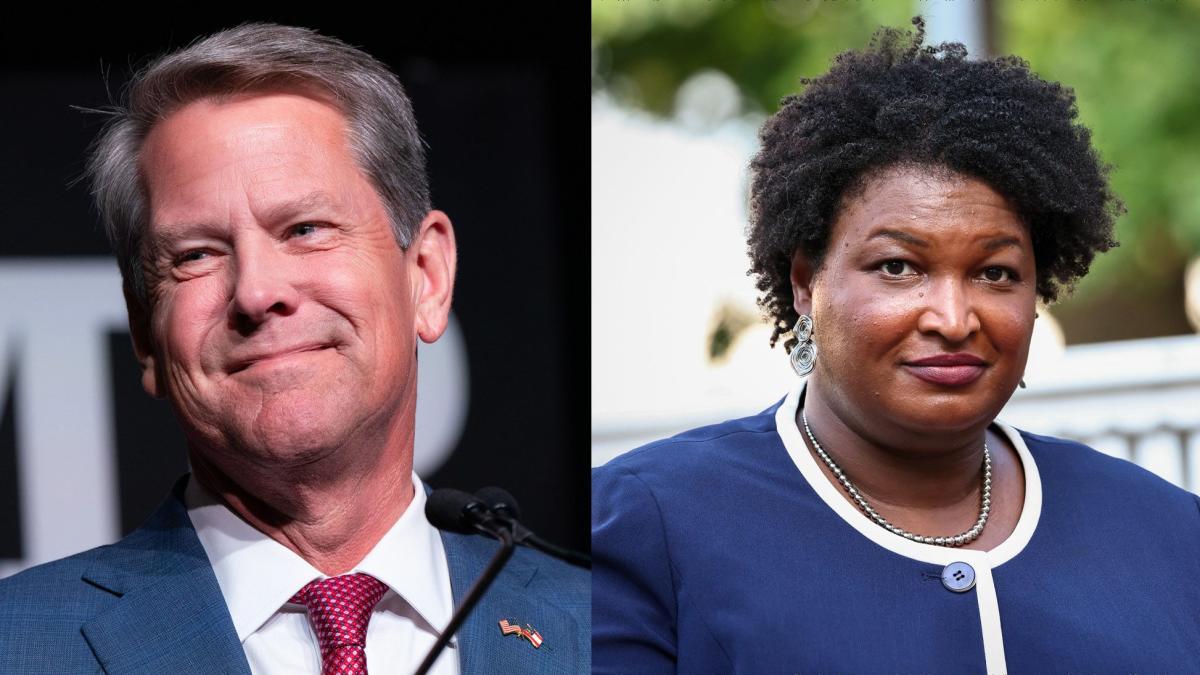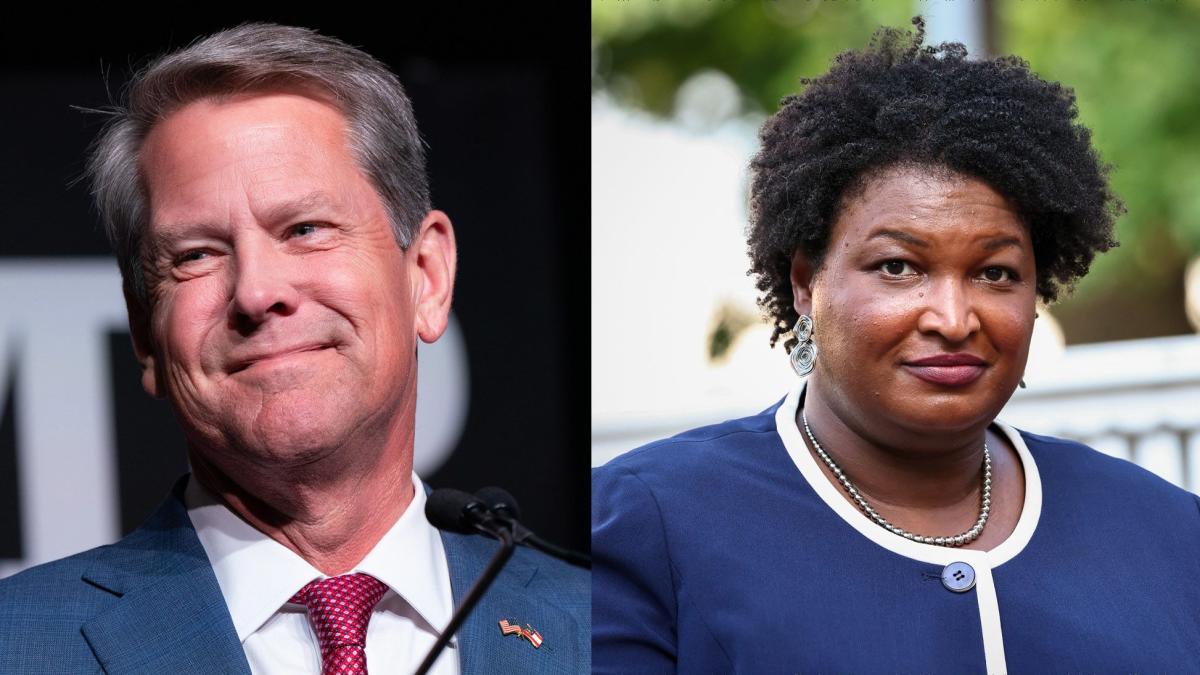
(Bloomberg) — With the November election just weeks away, Georgia Democrat Stacey Abrams is dealing with an unusual political problem.
Most Read from Bloomberg
She has become a star on the national political stage. But in her own state — where she has proved in recent presidential and Senate contests that she can get out the vote for Democratic candidates — she is struggling to gain momentum for her rematch with Republican Governor Brian Kemp.
One problem is tepid enthusiasm among a key segment of the Democratic base: Black men.
One-third of Black men registered in Georgia haven’t voted in the past several elections, with pollsters saying these disaffected voters just don’t think the outcome will improve their lives. In recent years, Black men also have shown they’re more willing to vote Republican, in Georgia and nationally. About 1 in 5 Black men voted for Donald Trump in 2020, up from 2016.
Together, these two groups — Black men who typically don’t vote and those who have crossed party lines — could determine the outcome in November. The key is figuring out the reasons for their choices and persuading them to change their minds.
“What they’re doing is consciously choosing to stay away from elections,” said W. Mondale Robinson, who founded the Black Male Voter Project in 2015, adding that little progress has been made in addressing many of the issues affecting the lives of Black men.
“It’s not a problem created by Stacey Abrams. It’s not a political phenomenon,” Robinson said. “We haven’t seen a decrease in the number of Black men killed by police. Black men are still unemployed at twice the rate of others, and those who are arrested and can’t pay cash bails sit in jail even though they haven’t been proven guilty. This is a conscious choice from people who do not see politics addressing their issues.”
It’s not just a problem for Abrams. “I’m getting quite a few inquiries about Black men over the last few weeks, from strategists and from candidates,” said Terrance Woodbury, a partner at HIT Strategies, a Washington-based polling firm that focuses on diverse voters. “There’s a sense of urgency in Georgia and around the country to address the concerns of Black men.”
Gender Gap
Abrams acknowledges what’s at stake. In an interview, Abrams said she has long viewed Black men as a critical segment of voters. “I actually focused on Black male voters in 2018,” Abrams said. “I have had very intentional conversations with Black male voters. My conversations are grounded in the fact that I respect Black men. I respect their voting power. Their voting power is strong and as candidates we have to be respectful of that and intentional about it.”
In a September poll conducted by the University of Georgia for the Atlanta Journal-Constitution, 74% of Black men said they planned to vote for Abrams, compared with 82% of Black women.
In 2018, when Kemp defeated Abrams by 55,000 votes, exit polls found that 97% of Black women had voted for Abrams, compared with 88% of Black men. That 9-point gender gap represented 120,000 votes.
“Had Black men voted for Abrams at a rate close to Black women, Abrams would already be governor,” Woodbury said.
“If Black men vote for me, we win,” she told a crowd of about 100 Black men gathered recently inside Forks and Flavors, a restaurant some 20 miles (32 kilometers) northwest of Atlanta. And during a recent podcast, Abrams said that Black men have “remarkable power” to determine the outcome of this year’s election.
Kemp is leading in most major polls, and the September AJC poll showed Abrams 8 percentage points behind the incumbent governor.
In a series of appearances that her campaign has dubbed “Stacey and the Fellas,” Abrams is meeting at restaurants and taverns, where Black men are invited to hear her discuss issues of particular concern — economic opportunities, fair access to capital, incarceration rates — to answer questions from local urban radio hosts, and to pose their own questions to the candidate.
But Black men have grown frustrated and cynical, said Woodbury, whose firm is conducting internal polls for US Senator Raphael Warnock, the Democrat incumbent being challenged by Republican Herschel Walker. In this Southern swing state, where the nation’s civil rights movement was born yet segregationists still have statues in their honor at the state Capitol building, there are many Black men who don’t believe Abrams, or anyone for that matter, wants to hear what they have to say.
Shifting Support
While voter turnout among Black women has helped propel Democratic candidates, including President Joe Biden and Warnock, to victory, support for Democrats among Black men has weakened. In 2008, 5% of Black male voters chose Republican presidential candidate John McCain in his loss to Barack Obama. By 2020, the percentage who chose Trump had jumped to 19%.
Read more: Georgia turnout funding falters after boosting Democrats in 2020
A comparable shift is taking place in Georgia. In 2014, when Republican businessman David Perdue ran for the US Senate and won, he received support from 7% of Black male voters. He ran for re-election in 2020 and lost, but his support among Black men had grown to 17%.
Meanwhile, of the 1.2 million Black men in the state who are registered to vote, about 400,000 haven’t voted in the past five elections.
Georgia native Marcellus Bahar, 27, is one. Bahar said he’s been registered since 2018 but has never voted — and he doesn’t plan to in November. “I just feel like it’s not going to make a difference for me,” said Behar, who works in a midtown Atlanta food court. “If Stacey Abrams gets elected, what difference is it really going to make?”
The lagging support for Abrams among Black men also speaks to another reality, said LaTosha Brown, co-founder of Black Voters Matter, a Georgia-based group. Abrams doesn’t fit any pre-conceived stereotype, and as a result all kinds of women see some of themselves in her, Brown said. Yet, that same quality gives some Black men pause.
“Just like racism is non-partisan, sexism is non-racist,” Brown said. “We all inherited a system that favors White male patriarchs. So, there is sexism. But there is also legitimate frustration among Black men in our community over underemployment, incarceration and restricted access to opportunities.”
Most Read from Bloomberg Businessweek
©2022 Bloomberg L.P.




